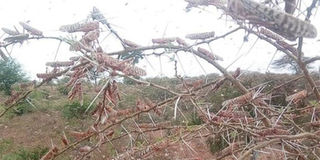Panic as desert locusts invade farms in Embu County

Some of the locusts which have invaded farms in Mbeere South, Embu County.
The second wave of desert locusts has invaded Embu County, throwing residents into panic.
The voracious insects crossed over to the area from Kitui County and are wreaking havoc on farms in the expansive Mbeere South Constituency.
The most affected villages are Machang'a, Kanthenge, Riachina, Kaburu and Ndunguni where sorghum, millet and green grams are grown in large scale.
The insects were first spotted on Friday evening and are destroying crops, which the residents depend on for survival, at a very high rate.
According to the residents and Mbeere South MP Geoffrey King'ang'i, the insects appear to be very hungry because they were not sparing anything edible.
“They are feeding on crops as well as grass and shrubs. They are dangerous insects," said Mr King'ang'i.
The residents expressed fears that the locusts may wipe out their sorghum, millet and other crops if urgent measures are not taken to eradicate them.
Appeal for intervention
They appealed to the government to intervene quickly before they lose all their crops and pastures for their animals to the locusts which have spread over an area estimated to be 10 square kilometres.
The residents said efforts to chase away the voracious feeders have borne no fruit.
They said if the locusts are not controlled, famine is imminent in the area.
"We may starve if our crops are destroyed and, therefore, we call upon the government to help us eliminate the locusts which are spreading very fast," one of the residents, Mr John Runji, said.
The MP lamented that since the invasion was reported, no government official has visited the area to assess the situation.
“If the locusts are not sprayed, then my people will suffer as they depend on crops to feed and to educate their children," he said.
Mr King'ang'i observed that the locusts have landed in the area even before the residents recover from the adverse effects of the Coronavirus pandemic.





